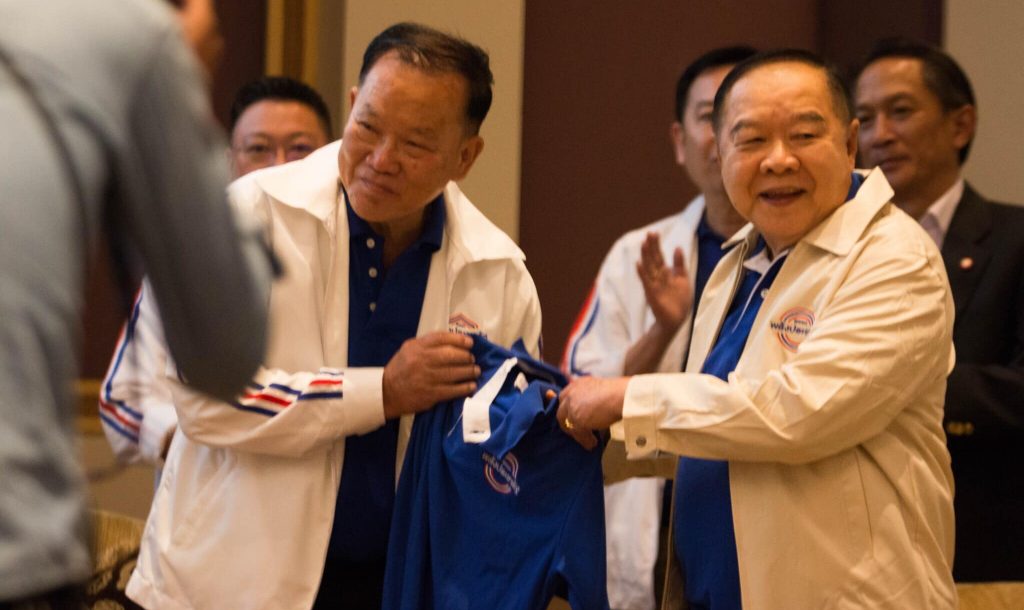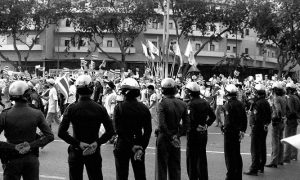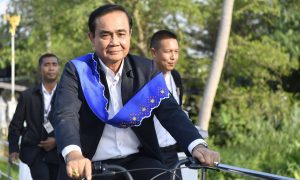This article examines efforts by Thailand’s most recent junta, the National Council for Peace and Order (NCPO), to dismantle and co-opt political networks revolving around locally influential people in the lead-up to the March 2019 election. The documentation organisation iLaw reports that no less than 91 of the MP candidates fielded by military proxy party Phalang Pracharat were former MPs coopted from other parties, in an electoral system with 350 constituencies. While programmatic linkages between parties and voters have taken unprecedented importance in Thai politics over the last two decades, recruiting MP candidates from rival political parties remained a key element of the NCPO’s electoral strategy.
Studying the NCPO’s investment in co-optation offers insight into Thai politics from the perspective of regime elites themselves—the factors which they appear to perceive as determining election outcomes, and the incentives which they appear to perceive as driving the participation of ordinary people in politics. Co-optation and the fragmentation of political parties have long been a feature of Thai politics, though attention to such strategies has waned since the emergence of more coherent political parties associated with Thaksin (even as they continued the swallowing up of political factions alongside the promotion of a party brand and policy platforms). Phalang Pracharat’s electoral strategists appeared to view co-opting locally popular politicians as still an expedient method for gaining votes—more expedient, at least, than building up a national political party unified by either a coherent political ideology or policy platform.
Whatever the effectiveness of this strategy, the NCPO engaged in extensive efforts to recruit former MPs from rival political parties to run as electoral candidates in key constituencies. Phalang Pracharat’s electoral candidates ultimately encompassed figures who were former members of a spectrum of rival political parties, such as Pheu Thai and the Democrat Party. The regime’s political strategists appeared to believe voters would ultimately cast their ballots on the basis of loyalty to an individual candidate, over their identification with a party’s brand or its governance record.
Campaigns of coercion
In the 2019 election, a sizeable portion of the military proxy party’s electoral candidates were “pulled” (phalang dud) from other parties. Of the 97 seats ultimately won by Phalang Pracharat, 37 constituency seats were won by candidates which had been co-opted from other parties. 22 of these candidates had at one point or another represented Thaksin-aligned parties (Pheu Thai, People’s Power Party and Thai Rak Thai). These numbers above do not include influential figures co-opted from other parties that did not run as electoral candidates, but who were involved in campaigning in other capacities such as vote canvassers and spokespeople.
To be sure, some co-opted candidates lost in their constituencies. All the same, the regime invested significant resources and efforts into the strategy of co-optation. In contrast, the party’s efforts were sluggish in the tasks of establishing durable party loyalty and a clear policy platform, suggesting strategists believed the co-optation of political networks would be decisive in pulling Phalang Pracharat over the line. Though the NCPO had been in power for years, party leaders only registered Phalang Pracharat on 2 March 2018 (even though the NCPO announced a general election for November 2018, before it was delayed to February 2019 and once again to 24 March 2019). Prajak Kongkirati describes Phalang Pracharat as “hastily created only a year before the final election date, without a clear campaign strategy or policy platform”, contrasting it with long-standing parties which have led other authoritarian governments in Southeast Asia such as Golkar in Indonesia and the People’s Action Party in Singapore. Phalang Pracharat could not hope to enjoy the voter loyalty commanded by long-standing parties such as the Democrats and Pheu Thai.
Phalang Pracharat did enjoy a significant advantage over rival parties, which were incapacitated by a ban on political party activities during the NCPO’s rule. Even so, the military proxy party appeared in no rush to campaign on a coherent and distinct suite of policies even after the ban was lifted on December 2018. The core of Phalang Pracharat’s policy platform involved expanding Pracharat intiatives, a catch-all brand for welfare policies which had been initiated under the NCPO. But Phalang Pracharat’s welfare policies at best neutralised the distinctiveness of the party’s rival, Pheu Thai, rather than carving out a distinctive policy platform for Phalang Pracharat in its own right. As Thorn Pitidol and Weerawat Phattarasukkumjorn point out, many Pracharat policies were continuations of welfare policies inaugurated under Thaksin-aligned governments. Just nine days before the general election, the party abruptly announced a suite of key policies including a raise to the minimum wage and income tax cuts.
So why did some members of other political parties defect to Phalang Pracharat? Some from more conservative parties likely supported the continuation of military rule under democratic guises. As is common practice with Thai political parties, others were likely lured by high-level patronage and the promise of financial rewards or attractive political positions. After forming government, some factions in the governing coalition threatened to jump ship after Phalang Pracharat allegedly reneged on promised cabinet positions. Pragmatists may have simply seen joining the pro-regime party as the safest route for securing office, given that the electoral playing field was stacked in Phalang Pracharat’s favour and other parties had been harassed and suppressed under the junta.
In several cases, however, the NCPO’s persecution of the opposition after the coup made opposition figures vulnerable to co-optation. From the very first days of coming into power, the NCPO exercised its extraordinary powers to intervene and expel figures from local administrative and political positions who were suspected of being uncooperative, allied with Thaksin-aligned governments, or sympathetic to the anti-establishment red shirts. At the time, regime elites may not have had preparations for electoral competition in mind, concerned perhaps simply to ensure compliance from local administrators in the aftermath of the coup. All the same, their coercive efforts lay the foundations for Phalang Pracharat’s eventual strategy of co-opting people of influence.
The junta continually promulgated “NCPO Orders” and “NCPO Head Orders” to remove hundreds of bureaucrats and local administrators from their seats. Just five days after the coup, the NCPO released an order ousting nine provincial governors believed to be allied with the former Yingluck government. The next day, a second order displaced another five governors in provinces that had been key sites of red shirt mobilisation. By May 2017, a total of 331 government officials had been removed or transferred under accusations of corruption or failing to do their jobs, allegations that he describes as often “unclear or unsupported by concrete evidence.”
Hand in hand with these removals came the exercise of Article 44 to appoint individuals within the NCPO’s network to local administrative and political organs. In April 2016, NCPO Head Order 12/2016 was used to remove and appoint governors in the provinces of Si Sa Ket, Tak, Chanthaburi and Pattani. Meanwhile in the years 2017 and 2018, Article 44 was exercised to remove and shuffle hundreds of officials. Under the NCPO, elections for provincial legislatures were suppressed entirely. A nomination committee comprised of regime-aligned bureaucrats was empowered to make appointments when office terms expired. In most cases, the committee elected to reappoint incumbents if they had avoided disagreements with the regime. The removal of opposition figures coupled with this maintenance of compliant bureaucrats and politicians in positions of power obviously incentivised cooperation with the junta.
Throughout these dismissals and appointments, the NCPO also subjected local figures of influence to continual harassment and intimidation, both through the judicial process and the deployment of state security officers. Ironically, the NCPO justified its interventions in local governance through the discourse of a crackdown on phu mi itthiphon [people of influence]. Thai governments have long exploited such emergency policies to suppress the opposition, with itthiphon used pejoratively in official discourse to refer to powerful individuals who circumvent and destabilise law and order. In 1954, Field Marshal Sarit Thanarat enforced a policy of “subduing hooligans” while in 1959 the government of Chatichai Choonhavan established a specialist unit devoted to the suppression of phu mi itthiphon. In 2002, Thaksin ordered governors and the directors of police stations across the country to compile lists of phu itthiphon. The NCPO government drew upon this old discourse once again in NCPO Order No. 13/2016, which conferred power upon the military to suppress the “mafias” of phu itthiphon.
Pracharat welfare depoliticises Thailand’s “political peasants”
สวัสดิการประชารัฐกับการเปลี่ยนแปลงความสัมพันธ์รัฐ-ชนบทไทย
The endurance of itthiphon
While the NCPO may have deprived locally influential opposition figures of formal amnat, it did not extinguish informal itthiphon. In 1991, Yoshifumi Tamada famously distinguished between amnat (formal authority derived from an official position) and its informal counterpart ittiphon, arguing that “bureaucratic polity theorists, especially Thai scholars, seem to make too much of the institutional or formal aspects of Thai politics.” Many former MPs who found themselves “out of work” told one of the authors during interviews that they continued to play quasi-official roles in public life during the NCPO’s rule. They no longer had the power to contribute to budgetary amendments in parliament or the resources to decisively fix problems that citizens presented to them. However, many remained sources of expertise and advice in their local communities and could sometimes still draw upon contacts in administrative organisations to resolve problems. They continued to maintain a busy schedule of community functions that fall under the traditional purview of local politicians: funerals, weddings, monkhood and merit-making ceremonies. Politicians who were able to maintain their political networks during the NCPO’s rule did not rely on state resources but refocussed their influence around their charisma or barami.
In basing its electoral strategy on co-optation, Phalang Pracharat’s strategists themselves acknowledged that the itthiphon of locally influential opposition figures had endured—in contrast to the party’s own lack of sustained efforts to build a profile despite five years of military rule. Phalang Pracharat co-opted individuals with long-standing and demonstrated popularity in a constituency. 20 out of the 21 former Pheu Thai constituency MPs who ran with Phalang Pracharat in the 2019 election were elected. In 2018, eight chief executives of Provincial Governance Organisations—who had been previously removed under NCPO Head Orders—were restored to their former roles after they lent their own support or pulled the support of influential relatives to Phalang Pracharat. In Nakhon Phanom, Somchob Nitipoj fired his two deputies—one who was affiliated with Pheu Thai and the other with Bhumjai Thai—after returning to the role of chief executive. Another case related to Dejnattawit Teriyapirom, the son of former Commerce Minister Boonsong Teriyaphirom. In 2017, the Supreme Court had sentenced the latter to prison for corruption in relation to Yingluck’s rice pledging scheme. In 2019, Dejnattawit Teriyapirom resigned from Pheu Thai, though fell short of winning a seat for Phalang Pracharat in Chiang Mai.
A particularly significant co-optation was that of Capt. Dr. Thamanat Prompow, whose name had been among those summoned in a list of phu mi itthiphon in 2016. In 2014, Thamanat had registered as a party-list candidate for Pheu Thai (before a nullified election) and had previously been active in the red shirt movement. He exercises significant political and business influence in his home province of Phayao, overseeing several businesses that involve high-level government concessions. His wife, Chulasinee Prompow, is herself the mayor of the municipality while his little brother was previously the vice chief executive of the Phayao Provincial Administrative Organisation. By 2019, Thamanat was a member of Phalang Pracharat’s electoral strategy committee in the northern region. He played a central role in negotiations to convince former Pheu Thai MPs in northern provinces to change allegiance to Phalang Pracharat. In Phayao, a province previously dominated by Thaksin-aligned parties, Phalang Pracharat saw victories in two out of three constituencies.
In the leadup to the 2019 election, cooptation remained a key characteristic of Phalang Pracharat’s electoral strategy. The party co-opted locally-influential figures as electoral candidates, sometimes through the promise of rewards and sometimes after a campaign of coercion. The party expected in turn that the candidate would leverage their influence and networks in constituencies to pull votes to the military’s proxy party. In the end, Phalang Pracharat encompassed the fractures which characterise a traditional Thai political party: while many Phalang Pracharat MPs are genuinely supporters of the leadership of former junta leader Prayut Chan-ocha, others are a hodgepodge of politicians united by neither a firm commitment to a specific ideology nor policy priorities.
 Facebook
Facebook  Twitter
Twitter  Soundcloud
Soundcloud  Youtube
Youtube  Rss
Rss 



